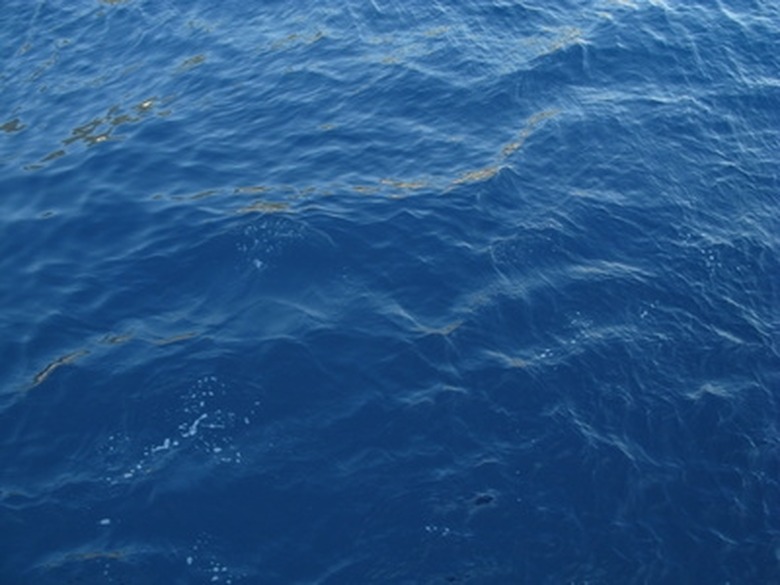Why Is Salt Water Heavier Than Tap Water?
Salt water can be described as heavier than tap water, provided this is understood as "per unit volume" of water. Scientifically stated, a volume of salt water is heavier than an equal volume of tap water because salt water has a higher density than tap water. Tap water is relatively pure, typically containing small amounts of mineral salts and smaller amounts of organic matter. Water solutions highly concentrated in dissolved salts have densities much greater than pure or tap water.
Density and Specific Gravity
Density and Specific Gravity
Density and specific gravity are terms that describe the concentration of a substance by mass. Density is defined as the mass of a substance per unit volume, usually expressed as grams per cubic centimeter. For example, the density of pure water at 39 degrees Fahrenheit is 1 gram per cubic centimeter, and the average density of seawater is about 1.027 grams per cubic centimeter. Specific gravity, which is defined as the ratio of the density of a substance to the density of water, is a measurement used in many scientific applications. For most substances, density and specific gravity are nearly identical at room temperature.
Solubility of Salts
Solubility of Salts
The explanation of the higher density of salt water is found in the formula weights of salt compounds. Water is composed of the relatively light atoms hydrogen and oxygen, which have atomic weights one and 16, respectively. Most salts are composed of heavier metallic atoms, such as sodium, magnesium and potassium, which have atomic weights 23, 24 and 39, respectively. The metallic atoms may be bonded to other heavy atoms, such as chlorine, bromine and iodine, which have atomic weights 35, 80 and 127, respectively. Salts dissociate into ions (charged atoms) when dissolved in water. The water molecules coordinate around the heavy ions so that the volume of the solution does increase but to a lesser degree than the weight of the solution.
Density of Salt Solutions
Density of Salt Solutions
Hundreds of chemical compounds are classified as salts. Some salts, such as sodium chloride and potassium iodide, are highly soluble in water at room temperature. Many others, such as barium sulfate and calcium phosphate, are practically insoluble even at higher temperatures. The maximum density of a salt solution depends on the formula weight of the salt, the natural solubility or "solubility product constant" of the salt, and temperature.
Buoyant Effect of Salt Water
Buoyant Effect of Salt Water
Objects immersed in salt water have a greater tendency to float than they do in pure or tap water, which is to say they are more buoyant. This effect arises from the greater buoyant, or upward, force exerted on objects by salt water due to its greater density. The buoyant force exerted on immersed objects by fluids is implied in Archimedes' Principle, which states that any object completely or partially immersed in a fluid displaces its own weight of fluid. An object immersed in tap water experiences greater "heaviness" than in salt water because it displaces a lesser weight of tap water.
Cite This Article
MLA
Merry, Michael. "Why Is Salt Water Heavier Than Tap Water?" sciencing.com, https://www.sciencing.com/salt-water-heavier-tap-water-8735703/. 24 April 2017.
APA
Merry, Michael. (2017, April 24). Why Is Salt Water Heavier Than Tap Water?. sciencing.com. Retrieved from https://www.sciencing.com/salt-water-heavier-tap-water-8735703/
Chicago
Merry, Michael. Why Is Salt Water Heavier Than Tap Water? last modified March 24, 2022. https://www.sciencing.com/salt-water-heavier-tap-water-8735703/
